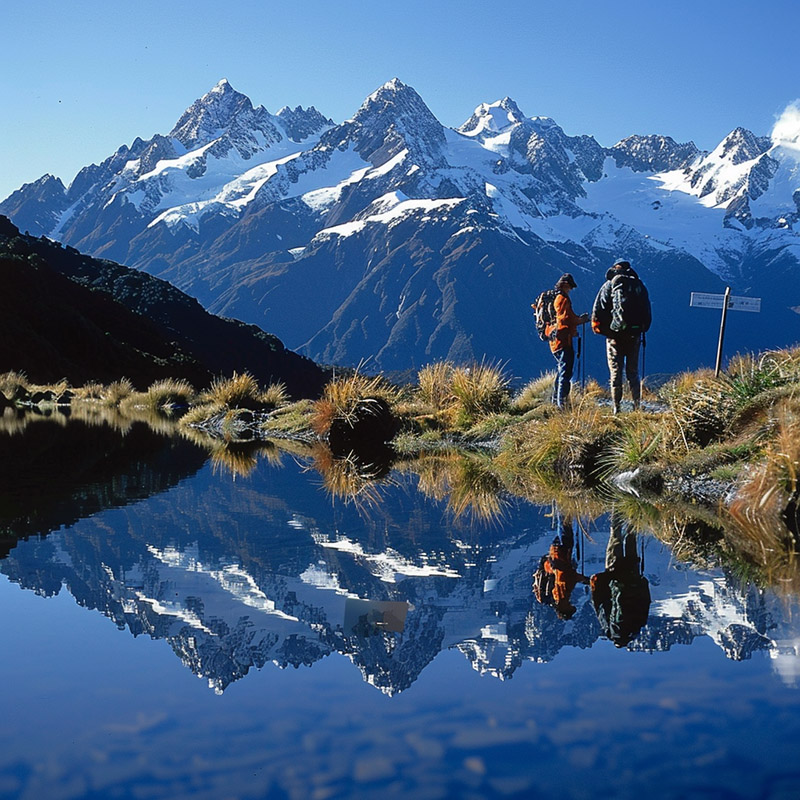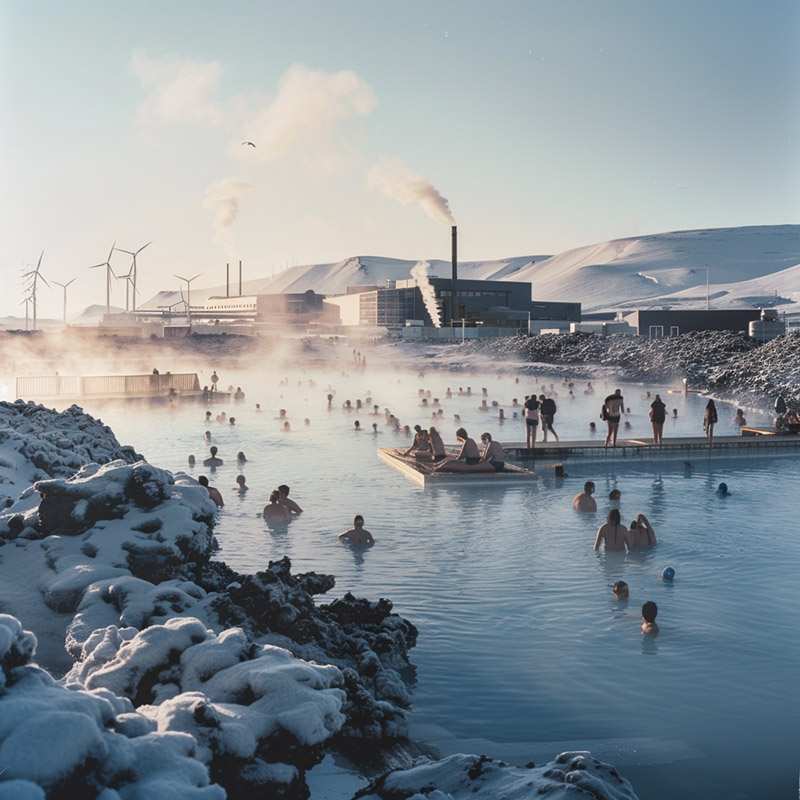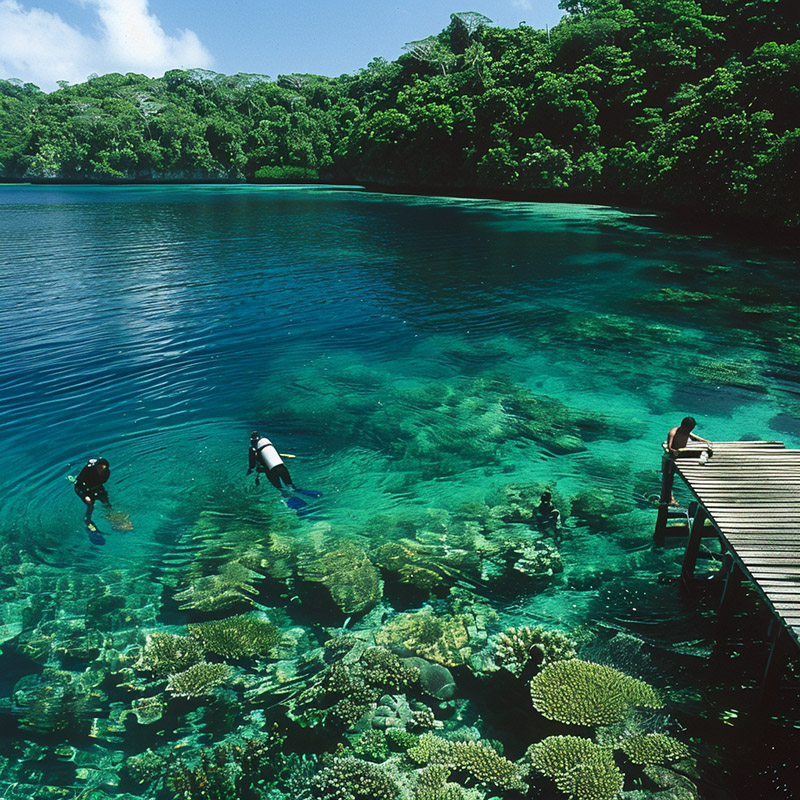1. Costa Rica
Known for its dedication to conservation and sustainability, Costa Rica offers lush rainforests, diverse wildlife, and eco-lodges that emphasize minimal environmental impact and support local communities.

Educational Benefits of Travel to Costa Rica
Traveling to Costa Rica offers an unparalleled educational experience in environmental conservation and sustainable living. Visitors can learn firsthand about biodiversity through guided tours in rainforests and cloud forests, where experts explain the ecosystem's intricacies and the importance of preserving such environments. Staying in eco-lodges further educates travelers on sustainable practices in hospitality, from water conservation to renewable energy use, illustrating how tourism can coexist with nature conservation.
2. New Zealand
With its breathtaking landscapes, New Zealand promotes eco-tourism through its numerous national parks, conservation efforts, and opportunities for outdoor adventures with a strong commitment to preserving its natural beauty.

Educational Benefits of Travel to New Zealand
A journey to New Zealand is a lesson in the stewardship of natural beauty and cultural heritage. Travelers can engage in educational programs that explore the Maori culture, offering insights into traditional practices and their relationship with the land. The country's numerous conservation initiatives, from predator-free islands to wildlife sanctuaries, provide practical examples of ecological preservation and the efforts required to maintain the natural landscape in the face of invasive species.
3. Iceland
Famous for its geothermal energy and stunning natural wonders, Iceland is a leader in sustainability. Travelers can explore glaciers, hot springs, and waterfalls while learning about renewable energy practices.

Educational Benefits of Travel to Iceland
Iceland's unique geological features, from geysers and hot springs to glaciers and volcanic landscapes, serve as a live classroom for geological and environmental studies. Educational tours explain the science behind these natural wonders and Iceland's pioneering use of geothermal and hydroelectric power. This demonstrates sustainable energy solutions and the importance of harnessing renewable resources in combating climate change.
4. Norway
Norway's commitment to sustainability is evident in its well-preserved natural landscapes, eco-friendly public transportation, and green initiatives in urban areas. The country offers stunning fjords, northern lights, and outdoor activities with minimal environmental footprint.

Educational Benefits of Travel to Norway
Traveling through Norway, with its dramatic fjords, northern lights, and robust environmental policies, offers lessons in geography, climate science, and sustainable urban planning. Educational programs highlight Norway's commitment to conservation, renewable energy, and sustainable fisheries, providing a model for environmental governance. The country's integration of nature into daily life and emphasis on outdoor activities also teaches the value of environmental appreciation and preservation.
5. Bhutan
As the world's only carbon-negative country, Bhutan offers a unique travel experience with its strong emphasis on conservation, sustainable development, and promotion of Gross National Happiness over GDP.

Educational Benefits of Travel to Bhutan
Visiting Bhutan is an immersive experience in cultural preservation and the philosophy of Gross National Happiness, which prioritizes societal well-being over economic growth. Educational tours delve into how Bhutan has maintained its cultural identity while implementing progressive environmental policies, such as maintaining a carbon-negative status. This provides a unique perspective on balancing development with environmental and cultural preservation.
6. Slovenia
Slovenia, particularly its capital Ljubljana, which was named the European Green Capital, is known for its green spaces, sustainable tourism practices, and efforts to maintain its extensive natural and cultural heritage.

Educational Benefits of Travel to Slovenia
Slovenia, particularly its capital Ljubljana, offers educational insights into green urban design and sustainability initiatives. Tours and programs explore how the city has achieved its green credentials, from waste management and cycling infrastructure to the preservation of green spaces. This showcases practical applications of environmental policies in urban settings, offering inspiration and lessons for sustainable city planning.
7. Kenya
Kenya's eco-lodges and conservation projects within its wildlife reserves and national parks offer sustainable safari experiences, allowing visitors to witness incredible wildlife while supporting conservation efforts and local communities.

Educational Benefits of Travel to Kenya
A safari in Kenya is not just an adventure but an educational journey into wildlife conservation and community-based tourism. Visitors learn about the challenges and successes of wildlife conservation directly from conservationists, understanding the critical role of protected areas and community engagement in preserving biodiversity. This experience highlights the intricate balance between human needs and wildlife conservation, emphasizing the importance of sustainable tourism.
8. Galapagos Islands, Ecuador
This unique archipelago is a leader in sustainable tourism, with strict visitor regulations to protect its unique ecosystem. Travelers can experience unparalleled wildlife viewing with minimal environmental impact.

Educational Benefits of Travel to the Galapagos
The Galapagos Islands offer a living laboratory for learning about evolution, conservation, and the delicate balance of ecosystems. Guided tours with naturalists provide insights into Charles Darwin's observations and the ongoing efforts to preserve the islands' unique biodiversity. This experience educates travelers about the importance of conservation and the challenges of protecting isolated ecosystems from human impact.
9. Finland
Renowned for its pristine natural environments, Finland encourages sustainable travel through its national parks, eco-friendly accommodations, and commitment to preserving its vast forests and lakes.

Educational Benefits of Travel to Finland
Traveling to Finland, particularly in winter, offers educational opportunities in understanding the Arctic environment, the impacts of climate change, and the cultural significance of the Northern Lights. Educational programs can include visits to research stations, discussions on Sami culture, and lessons in sustainable forestry practices, illustrating how Finland balances modernity with environmental stewardship and cultural preservation.
10. Palau
As the first nation to change its immigration policy for environmental protection, Palau is a pioneer in sustainable tourism. Visitors sign a pledge to act in an eco-friendly manner, supporting the preservation of its marine and terrestrial paradises.

Educational Benefits of Travel to Palau
Visiting Palau educates travelers on marine conservation, the impact of climate change on coral reefs, and sustainable tourism practices. The Palau Pledge, required of all visitors, serves as a constant educational tool, emphasizing the traveler's responsibility towards environmental preservation. Diving excursions and conservation workshops teach about reef ecosystems, the threats they face, and the global significance of protecting such marine biodiversity.